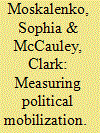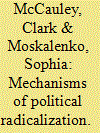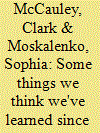| Srl | Item |
| 1 |
ID:
087764


|
|
|
|
|
| Publication |
2009.
|
| Summary/Abstract |
In this paper we review and extend measures of political mobilization: the increasing extremity of beliefs, feelings, and behaviors in support of inter-group conflict. Building on previous research, we introduce the Activism and Radicalism Intention Scales (ARIS). The Activism Intention Scale assesses readiness to participate in legal and non-violent political action, whereas the Radicalism Intention Scale assesses readiness to participate in illegal or violent political action. In ad-hoc samples of U.S. and Ukrainian undergraduates, and in an Internet panel survey representative of the U.S. population, Activism and Radicalism intentions formed two correlated but distinguishable dimensions. The popular "conveyor belt" metaphor of radicalization (implying that activism leads easily to radicalism and that most radicals emerge from activism) found only mixed support in our results. Discussion suggests the potential usefulness of the ARIS for learning about how individuals move from political attitudes and beliefs to political action, including political violence and terrorism.
|
|
|
|
|
|
|
|
|
|
|
|
|
|
|
|
| 2 |
ID:
087766


|
|
|
|
|
| Publication |
2009.
|
| Summary/Abstract |
In this paper we review and extend measures of political mobilization: the increasing extremity of beliefs, feelings, and behaviors in support of inter-group conflict. Building on previous research, we introduce the Activism and Radicalism Intention Scales (ARIS). The Activism Intention Scale assesses readiness to participate in legal and non-violent political action, whereas the Radicalism Intention Scale assesses readiness to participate in illegal or violent political action. In ad-hoc samples of U.S. and Ukrainian undergraduates, and in an Internet panel survey representative of the U.S. population, Activism and Radicalism intentions formed two correlated but distinguishable dimensions. The popular "conveyor belt" metaphor of radicalization (implying that activism leads easily to radicalism and that most radicals emerge from activism) found only mixed support in our results. Discussion suggests the potential usefulness of the ARIS for learning about how individuals move from political attitudes and beliefs to political action, including political violence and terrorism.
|
|
|
|
|
|
|
|
|
|
|
|
|
|
|
|
| 3 |
ID:
082926


|
|
|
|
|
| Publication |
2008.
|
| Summary/Abstract |
This article conceptualizes political radicalization as a dimension of increasing extremity of beliefs, feelings, and behaviors in support of intergroup conflict and violence. Across individuals, groups, and mass publics, twelve mechanisms of radicalization are distinguished. For ten of these mechanisms, radicalization occurs in a context of group identification and reaction to perceived threat to the ingroup. The variety and strength of reactive mechanisms point to the need to understand radicalization-including the extremes of terrorism-as emerging more from the dynamics of intergroup conflict than from the vicissitudes of individual psychology.
|
|
|
|
|
|
|
|
|
|
|
|
|
|
|
|
| 4 |
ID:
133538


|
|
|
|
|
| Publication |
2014.
|
| Summary/Abstract |
It is a pleasure to have this opportunity to respond to a distinguished colleague's concerns about the progress of terrorism research since the 9/11 attacks. Marc Sageman sees little progress and identifies numerous impediments to research, notably including lack of good data and over-reliance on formal modeling
|
|
|
|
|
|
|
|
|
|
|
|
|
|
|
|
| 5 |
ID:
132363


|
|
|
|
|
| Publication |
2014.
|
| Summary/Abstract |
Research has shown that there is no profile of individual characteristics of group-based terrorists, but profiling the characteristics of lone wolf terrorists may yet be possible. In this article, we bring together suggestions about what a lone wolf profile might look like. We describe a two-pyramids model that distinguishes radicalization of opinion from radicalization of action, then use this model to review three case histories of lone wolf terrorists. We also review results comparing two kinds of mostly lone actor violent offenders: assassins and school attackers. Results highlight the gap between radical opinion and radical action, and suggest two profiles of lone wolf terrorists: disconnected-disordered are individuals with a grievance and weapons experience who are social loners and often show signs of psychological disorder; caring-compelled are individuals who strongly feel the suffering of others and feel a personal responsibility to reduce or avenge this suffering.
|
|
|
|
|
|
|
|
|
|
|
|
|
|
|
|